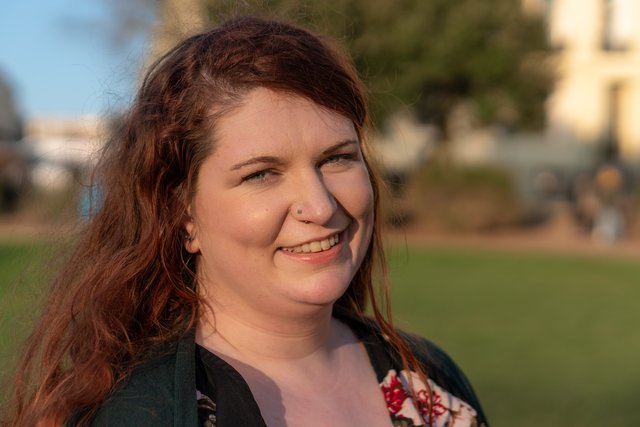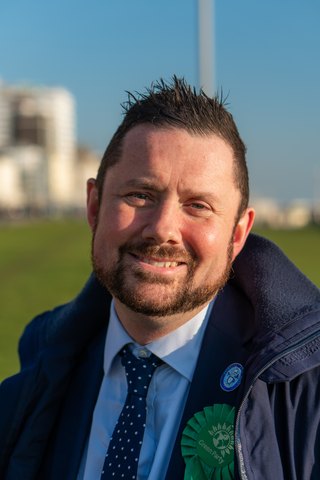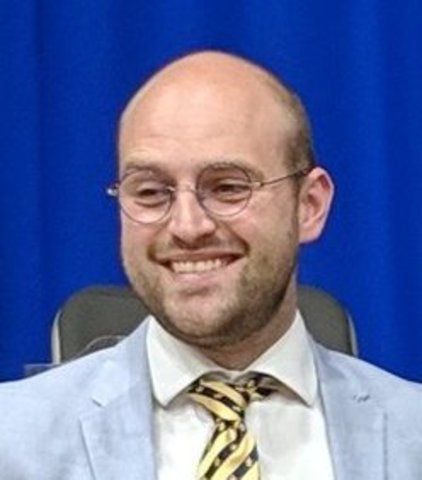Brunswick and Adelaide candidates explain why they want to be a councillor. They also answer questions sent in by the public via social media.
Not your ward? Click here to find your neighbourhood on our interactive map.
Nine candidates are standing for the two Brighton and Hove City Council seats in the Hove ward of Brunswick and Adelaide.
Why do you want to be a councillor?
Green candidate Hannah Clare is a digital communications manager for a charity:

I think diversity in politics is really important but often lacking.
As a councillor, I will be able to use my skills and passion to work with the vibrant local community in Brunswick and Adelaide to make change for the benefit of all residents.
John Gartside is a retired systems analyst standing for the UK Independence Party:

We have a wonderful city with a great heritage. However, the face the city gives to the residents and the world is sub-optimal as a result of poor decision-making by present and previous councils. We need to do better.
Phélim Mac Cafferty is the convenor of the current Green group of councillors:

I have been a city councillor for the past eight years and first stood for office soon after the coalition government vowed to shrink public services with colossal cuts.
In that time the Conservative austerity experiment has driven councils to the brink, punishing the most vulnerable. I firmly believe we still need councillors with the creativity and resilience to speak up for public services and communities.
Joy Robinson works in public sector procurement and is standing for Labour:

I intend to use my experience in public sector procurement to review and bring back in-house appropriate services, so achieving best value from council expenditure.
Deeply believing in the key Labour values of fairness, equality and justice, I intend to reflect these values once elected. I will concentrate on building a city working for all, which leads the way in “community wealth building”, a fairer living wage, increased social housing and tackling homelessness.
I also intend to listen closely to constituents through fortnightly surgeries and am committed to endeavouring to find practical ways of addressing people’s concerns at grassroots level.
Darryl Telles is an author and is standing for Labour:

I love the neighbourhood I live in and I want to make it even better. But during the past eight years, while we have had Green councillors, the area has been neglected. We hear daily from residents about poor street lighting, substance misuse and anti-social behaviour which our two Green councillors haven’t fixed.
Now, after working in local councils for the past 30 years, I want to utilise my experience to help residents to improve things locally and get things done in Brunswick and Adelaide ward.
It’s important that we return Labour councillors so that we have a majority progressive administration to end the uncertainty in the council chamber where far too often policies have been stymied by Greens and Tories voting together.
Christian Chadwick is a clinical pharmacist at the Royal Alexandra Children’s Hospital, in Brighton. He is standing for the Liberal Democrats:

Why do you want to be a councillor?
I would like the council to become one where the views of as many people in the city are represented. I want to be a councillor to help achieve this for the city and help it make Brighton and Hove the best place to live for the people who call this city home.
What are you views on the design and impact on traffic of the Valley Gardens phase 3 project in Old Steine which includes making Madeira Drive one-way by the Palace Pier?
Hannah Clare and Phélim Mac Cafferty: The Valley Gardens project was envisaged as a city centre park and a desperately needed green lung. The changes across all three phases will help improve walking and cycling for the area and make it safer and greener for everyone in the city which is really important because the area of phase 3 includes the city’s top accident black-spot.
The previous Green administration won £8 million of external funding to pay for the scheme. Labour took to office four years ago vowing to derail that investment and has spent years delaying progress and so we are sadly not surprised to hear that people feel consultation has been “rushed”.
Greens have publicly pushed at council meetings for better acknowledgement of the concerns raised and have won a number of important assurances for pedestrians and cyclists.
John Gartside: Phase 3 should not proceed as planned because it is likely to cause more traffic congestion and therefore more air pollution. People are unlikely to be attracted away from the Royal Pavilion Gardens and the seafront by more green space where it is currently barely used.
Joy Robinson: The designs are currently being drawn up to a detailed design stage. All comments and issues raised are being addressed and we hope to see a detailed scheme which meets the needs of all residents and businesses/ visitors expected.
Those detailed designs will have to ensure that the city keeps moving while addressing the impacts of the climate change emergency and supporting a modern city where sustainable transport routes are protected and enhanced.
Darryl Telles: I fully support this idea which will have long-term benefits to the city in creating new pedestrian and cycle ways. It was Labour that managed to secure the funding for this project and put it into practice.
Christian Chadwick: The design of the project seems strange and I cannot see it reducing congestion in the city centre. From a safety point of view I think the replacement of the roundabout with traffic lights and the presence of a five-lane road are likely to reduce pedestrian safety in the area.
The scheme has had far too small a consultation for a project of its size and controversy. From a transparency point of view the planning for Valley Gardens has been completely inadequate.
There is a huge problem with dog owners leaving waste behind, either in bags or just out in the open in parks and street. What will you do to tackle dog owners not picking up poo?
Hannah Clare and Phélim Mac Cafferty: Green councillors in Brunswick and Adelaide have worked with local residents when they have raised concerns around dog poo in their area. This action has included arranging more signs on both the ground and on pavements.
We need to ensure that the city’s enforcement officers (following the abandonment of Labour’s disastrous outsourcing experiment) make tackling owners who don’t pick up their dogs’ waste a priority, alongside fly-tipping.
We commit in our manifesto to campaign for microchipping of pets which in some of the London boroughs has seen a massive decrease in dog mess. We will also make sure there are more designated bins to help dog walkers do the right thing.
John Gartside: Miscreants should be given community service in which they are engaged in poo removal from public spaces.
Joy Robinson: Our new enforcement officers who have been brought in-house are out and about in neighbourhoods and targeting those whose anti-social behaviours are affecting all our lives. We need to both educate and enforce our way out of this problem and we want that message to get through to all who chose to leave dog mess across our city.
Darryl Telles: Labour has introduced a new litter warden team to help in tackling this. It’s really important that our parks and gardens, while being accessible to dogs, should also recognise the need to educate their owners.
Christian Chadwick: The regulation and penalties are already in place. It is their enforcement that requires attention. Investigation needs to take place into the most suitable route for this, with options like the level of community presence by council officials and the expansion of roles by officials already operating in public spaces, such as those working in park maintenance.
The council is planning more electric vehicle charging points. To what extent do you support this and will you commit to electric vehicle only parking spaces?
Hannah Clare and Phélim Mac Cafferty: We are fully committed to rolling out electric vehicle charging points, both on street and in car parks. We have asked for support for electric charging schemes but we also know this needs to be sustainable, as was raised by Phélim at a council meeting recently.
We are concerned about badly installed points taking up more space from the pavement when they should be taking up space from the road. We support the policy of reserving spaces by charging points for electric vehicles and would seek innovative ways of including on-street charging points, eg, through existing street lamps.
John Gartside: The allocation of electric charging points should be phased to keep pace with the adoption of electric vehicles. However, a major shift to electric vehicles would predicate a massive increase in power generation and a corresponding upgrade of the power grid, neither of which is being considered by our betters in Parliament and Whitehall.
Joy Robinson: We fully support the installation of electric vehicle charging points (EVCPs) and in fact it is the Labour council that successfully bid for £300,000 funding from the government to allow the installation of 200 EVCPs.
Test sites are already in operation. It was noted at committee last June that the scheme might need to allow for mandatory parking bays for electric vehicle charging in the event, for example, it becomes clear that electric vehicle owners are having problems accessing advisory bays or to adapting over time to increased demand.
Darryl Telles: It has taken a Labour administration to finally secure funding to get this rolling and we need to move towards a carbon-neutral city as quickly as possible. I’ve sold my car because of the harmful effects it has on the environment in terms of air quality and pollution so I am totally in favour of making more parking spaces available for hybrid and electric only vehicles.
Christian Chadwick: Electric charging points for vehicles must be considered carefully to ensure they are rolled out in accordance with demand as it rises, so I would support the introduction of appropriate numbers of charging points, in appropriate locations.
I would also support the advance planning of future dedicated charging point locations to allow for the growth in electric vehicle usage as they become an option for more and more of the population.
If you design with children in mind, you also make it good for older people and create a healthier and more inclusive place that everyone can enjoy. How are you going to make the city safe and attractive for children to move around independently?
Hannah Clare and Phélim Mac Cafferty: The Green group response to City Plan Part Two, the city’s blueprint, and some of the amendments we won at budget council commit us to improving pedestrian routes, road crossings, cycle routes and bus services which all make the city safer and easier for children, older people and others with mobility difficulties to navigate.
We commit in our manifesto to work with Sussex Police to more effectively enforce speed restrictions on our roads. Cars are the number one cause of death and serious injury for children and young people.
In addition, we want to work with the police and crime commissioner to ensure the new promised funding for the city means we have more PCSOs and police officers on the ground to tackle anti-social behaviour and drug-related activity which will give children, parents and older people more confidence that moving around the city independently is safe.
John Gartside: Children should be taught to cross roads only at pedestrian crossings. Replace manually operated signals with automatic detection. Improve warnings where traffic is not coming from the right direction. Brighton is unlikely to become entirely safe for all.
Joy Robinson: We need a range of measures to be delivered across the whole city – better protected cycling and walking routes are key to this as well as a safe reliable public transport system.
We are also committed to setting up a fund to support improved community safety and neighbourhood policing measures to give people confidence in the safety and responsiveness of their local communities.
Darryl Telles: The future of our city will only be sustainable if it is one which is inclusive for all people, young and old, and particularly those with access needs. That’s why it is so important that in designing developments we actually involve such people. And I do not just mean consultation but actually testing things out with neighbourhood schools, local resident forums and community centres before decisions are taken.
Christian Chadwick: Our city travel infrastructure should be reformed to reduce dangers from both motor traffic itself and the air pollution it creates. Public transport in the city could be revolutionised by supporting greater numbers of electric buses, introducing a permanent park and ride scheme and expanding the cycle lane network.
Seagulls and foxes attack bins and rubbish is strewn across city streets. Sometimes people need to step up. How will you encourage people to get involved in keeping their community tidy?
Hannah Clare and Phélim Mac Cafferty: Green councillors in Brunswick and Adelaide have organised community tidy ups in the ward twice a year and held one as recently as March. We have committed to making these even more regular if elected in May, making use of the £33,000 community clean up fund won by Green councillors in this year’s budget.
Community tidy ups won’t solve this alone. We need sustainable solutions and more funding which is why our budget amendments included provision for much more direct investment in improving our streets. Locally and across the city, we have called for better signage, improved recycling and increased recycling collections.
John Gartside: The collection of rubbish is too infrequent to keep up with the rate of rubbish generation in some areas. It is not reasonable to expect someone who has walked down several flights of stairs to return with their rubbish repeatedly.
Joy Robinson: We have established the Tidy Up Team, who work with local community groups to provide the training, resources and support to enable community tidy up events and programmes to become an essential part of our community-based approach to these issues.
Darryl Telles: The Labour innovation of community clean up days should be extended to all wards in the city. They are a good way of people meeting their neighbours as well as keeping places tidy.
There is though no substitute to a good working relationship with the trades unions and the staff who clear up every day. I do not want to return to the days and weeks of the bin strikes when the Greens were in control.
>We had one of the lowest recycling rates in the country of 24 per cent and falling. Now things have got better with a rate of 30 per cent but I am conscious that still more can and must be done. It is not perfect by any means but that’s my main concern if we have a Green or Tory city administration.
What do you think needs to happen to help rough sleepers off the streets to help both the people and clean up “tent city” areas outside the station and on the beach to make public spaces safer and cleaner for everyone?
Hannah Clare and Phélim Mac Cafferty: The Green administration from 2011 to 2015 introduced Housing First, which is a proven effective method for ending homelessness. We would treble this investment if elected as the administration this May.
Even in opposition, we have forced changes to council rent policy to make rents genuinely affordable, expanded Housing First, and convinced the Labour council to fund a 365-day-a-year shelter.
In this year’s budget we secured an extra £7 million of funding for housing. We are committed to providing solutions that work and are committed to addressing our housing crisis and homelessness.
John Gartside: All solutions must be considered before allowing our city to deteriorate into developing world status with manifest extreme poverty in the midst of plenitude. It gives an atrocious appearance to visitors and it’s a waste of people’s lives. It must never become the new norm.
Joy Robinson: We are providing many services to support rough sleepers and this is now being effective in reducing the need to sleep rough in the city. We follow an approach of services engaging with rough sleepers and aiming to build solutions for individuals that will help move them away from and keep them off the streets. Where tents have been put up, there is an agreed tent protocol to be followed.
Darryl Telles: Rough sleeping has increased as a result of the Tory government’s austerity policies.
Ultimately we need a Labour government to end the benefits cuts, the bedroom tax and stop universal credit all of which has led us into this mess.
And we have to build more council homes. Labour has built 200 in the past five years and we will build another 800 if we gain a majority. This compares to the Greens who only built 15 new council homes in the four years when they were in charge. We will also bring all our temporary accommodation services in house so that those that need it have good standard places to live in.
Other candidates standing in Brunswick and Adelaide ward are Liberal Democrat Duncan Moore and Conservatives Roz Rawcliffe and Tricia Dearlove.








Strange, no comment from the Conservatives. Were they approached?
Hi Carole
Yes they were. The question files were sent out to call the political parties and were then distributed to the candidates.
You will find responses from Conservative candidates in various other parts of the city.
All Independent candidates were contacted individually.